文学术语
文学经典中的诗词鉴赏常用术语
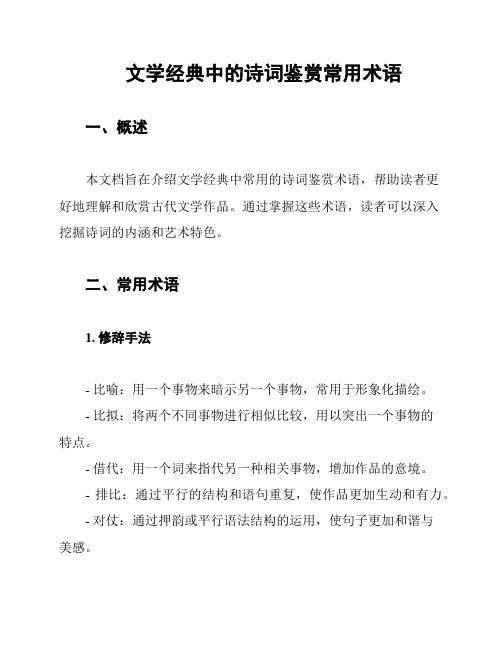
文学经典中的诗词鉴赏常用术语一、概述本文档旨在介绍文学经典中常用的诗词鉴赏术语,帮助读者更好地理解和欣赏古代文学作品。
通过掌握这些术语,读者可以深入挖掘诗词的内涵和艺术特色。
二、常用术语1. 修辞手法- 比喻:用一个事物来暗示另一个事物,常用于形象化描绘。
- 比拟:将两个不同事物进行相似比较,用以突出一个事物的特点。
- 借代:用一个词来指代另一种相关事物,增加作品的意境。
- 排比:通过平行的结构和语句重复,使作品更加生动和有力。
- 对仗:通过押韵或平行语法结构的运用,使句子更加和谐与美感。
2. 诗体类型- 古诗:古代中国文学中的一种诗体,以五言或七言为最常见的体制。
- 词:古代文学中的韵文表达形式,以表达作者的个人感情为主。
- 绝句:一种四行诗,每行五、七个字,形式简洁。
- 律诗:古代又称骈体诗,有严格的字数限制和特定的格律要求。
3. 修辞格- 典型比喻:明确指出比喻对象和被比喻对象。
- 间接比喻:通过暗示来表达比喻。
- 拟人:将非人的事物赋予人的形象和行为。
- 擬音:模拟物体的声音,增加描写的形象感。
- 倍数:通过增加倍数的描写来强调或夸张某种特征。
4. 主题与意境- 自然景色:描绘自然景色,如山水、花草等,寄托情感和思考。
- 爱情:表达爱情的美好与痴迷,揭示人性中的情感纠葛。
- 思乡:表现对故乡的深情怀念和思恋之情。
- 心灵与哲思:思考生命、时间、道德和人生意义等抽象问题。
三、总结本文档介绍了文学经典中常用的诗词鉴赏术语,包括修辞手法、诗体类型、修辞格和主题与意境等。
熟悉这些术语有助于我们更好地理解和欣赏古代文学作品的深层内涵和艺术特点。
希望读者通过本文档的学习,能够在鉴赏古代诗词时更加游刃有余。
中文文学术语

中文文学术语
1.叙事-指文本中叙述故事的方式和手法,包括时间序列、情感表达、人物塑造等方面。
2. 描写 - 指文本中对人物、物品、场景等进行具体生动的描述,展现出视觉、听觉、嗅觉、味觉等方面的细节。
3. 意象 - 指文本中使用形象的语言表达出来的抽象概念,如比喻、拟人等手法。
4. 比喻 - 指通过对两个事物的相似点进行比较,以达到给读者新的感受或理解的修辞手法。
5. 拟人 - 指将无生命的事物赋予人类的特征和行为,来表达作者的情感或增强作品的艺术效果。
6. 反讽 - 指通过说出与实际相反的话,以表达出作者的反感、批评或嘲讽。
7. 对比 - 指通过对两个相似或不同的事物进行对照,来突出文本中的主题、情感等。
8. 押韵 - 指文本中出现两个或多个音节相同的词汇,以增强诗歌、歌曲等的韵律美感。
9. 音律 - 指文本中音节的节奏、语调、音量等方面的组合,以产生艺术效果。
10. 主旨 - 指文本中的核心思想和主题,是作者所要表达的意义和观点。
- 1 -。
文学术语

文学术语Terms in English Literature1.Allegory (寓言)A tale in verse or prose in which characters, actions, or settings represent abstract ideas or moral qualities.寓言,讽喻:一种文学、戏剧或绘画的艺术手法,其中人物和事件代表抽象的观点、原则或支配力。
2.Alliteration (头韵)Alliteration is the repetition of the same initial consonant sound within a line or a group of words.头韵:在一组词的开头或重读音节中对相同辅音或不同元音的重复。
3.Allusion (典故)A reference to a person, a place, an event, or a literary work that a writer expects the reader to recognize and respond to.典故:作者对某些读者熟悉并能够做出反映的特定人物,地点,事件,文学作品的引用。
4.Analogy (类比)A comparison made between two things to show the similarities between them.类比:为了在两个事物之间找出差别而进行的比较。
5. Antagonist (反面主角)The principal character in opposition to the protagonist or hero or heroineof a narrative or drama.反面主角:叙事文学或戏剧中与男女主人公或英雄相对立的主要人物。
6. Antithesis (对仗)The balancing of two contrasting ideas, words, or sentences.对仗:两组相对的思想,言辞,词句的平衡。
文学评论术语
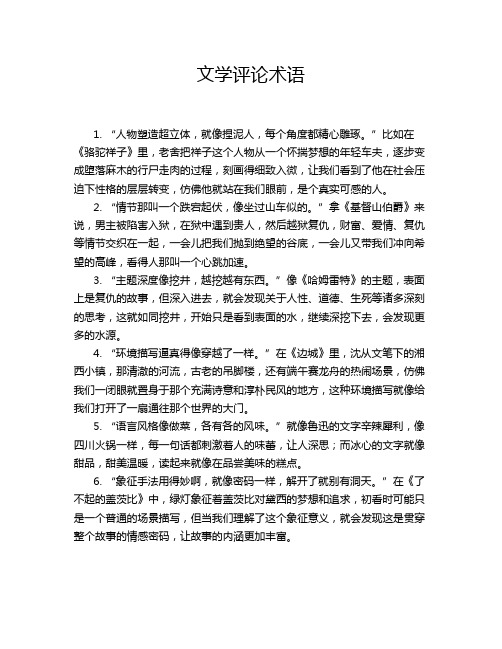
文学评论术语1. “人物塑造超立体,就像捏泥人,每个角度都精心雕琢。
”比如在《骆驼祥子》里,老舍把祥子这个人物从一个怀揣梦想的年轻车夫,逐步变成堕落麻木的行尸走肉的过程,刻画得细致入微,让我们看到了他在社会压迫下性格的层层转变,仿佛他就站在我们眼前,是个真实可感的人。
2. “情节那叫一个跌宕起伏,像坐过山车似的。
”拿《基督山伯爵》来说,男主被陷害入狱,在狱中遇到贵人,然后越狱复仇,财富、爱情、复仇等情节交织在一起,一会儿把我们抛到绝望的谷底,一会儿又带我们冲向希望的高峰,看得人那叫一个心跳加速。
3. “主题深度像挖井,越挖越有东西。
”像《哈姆雷特》的主题,表面上是复仇的故事,但深入进去,就会发现关于人性、道德、生死等诸多深刻的思考,这就如同挖井,开始只是看到表面的水,继续深挖下去,会发现更多的水源。
4. “环境描写逼真得像穿越了一样。
”在《边城》里,沈从文笔下的湘西小镇,那清澈的河流,古老的吊脚楼,还有端午赛龙舟的热闹场景,仿佛我们一闭眼就置身于那个充满诗意和淳朴民风的地方,这种环境描写就像给我们打开了一扇通往那个世界的大门。
5. “语言风格像做菜,各有各的风味。
”就像鲁迅的文字辛辣犀利,像四川火锅一样,每一句话都刺激着人的味蕾,让人深思;而冰心的文字就像甜品,甜美温暖,读起来就像在品尝美味的糕点。
6. “象征手法用得妙啊,就像密码一样,解开了就别有洞天。
”在《了不起的盖茨比》中,绿灯象征着盖茨比对黛西的梦想和追求,初看时可能只是一个普通的场景描写,但当我们理解了这个象征意义,就会发现这是贯穿整个故事的情感密码,让故事的内涵更加丰富。
7. “叙事节奏把握得就像跳舞的节拍,恰到好处。
”例如《老人与海》,海明威没有在开头就把老人的故事一股脑地倒出来,而是缓缓地、有节奏地讲述老人出海、与鱼搏斗的过程,不紧不慢,就像跳慢舞一样,每一个动作都充满力量和韵味。
8. “视角独特得像从外星人的眼睛看地球。
”《百年孤独》采用的那种魔幻现实主义的视角,讲述家族的故事,从布恩迪亚家族的兴起、繁荣到衰落,那种独特的视角就像是一个外星人在俯瞰人类社会的发展,让我们看到了很多平常看不到的东西。
文学学名词解释 (超全)

文学学名词解释 (超全)1. 文学文学是指人们用语言文字来表达思想感情、塑造形象、反映社会生活的艺术形式。
文学以其独特的表达方式和深刻的意义吸引着人们的关注,被视为一种对人类文明的重要贡献。
2. 小说小说是一种以叙事为主要手法,通过刻画人物形象、描写环境等方式来展示情节的文学作品。
小说是一种虚构的故事形式,通过描绘人物的生活经历和内心感受,展示人类的情感、思想和人性。
3. 诗歌诗歌是一种运用特定的韵律、节奏和语言的文学表达方式。
诗歌以其独特的形式和语言美感,通过抒发情感、表达思想、描绘景象等方式来传达诗人的内心世界。
4. 散文散文是一种以散漫自由的方式表达作者思想感情的文学形式。
散文没有固定的韵律、格律和形式限制,可以自由探索表达方式,借助故事、描写、议论等手法来传达作者的思考和情感。
5. 戏剧戏剧是一种通过演员表演、舞台布景等方式来展示故事情节的文学艺术形式。
戏剧通常具有明确的剧本和角色设定,通过舞台上的表演和情节发展来引发观众的情感共鸣。
6. 故事故事是以时间顺序展开的一连串事件的叙述。
故事可以是真实的,也可以是虚构的,通过引发读者/听众的情感共鸣来传递作者的主题和意图。
7. 寓言寓言是一种通过虚构的故事来传递寓意或教育意义的文学形式。
通常,寓言以动物或其他非人类角色来代表人类,并通过讽刺、比喻等手法来表达思想和价值观。
8. 叙事叙事是一种通过时间顺序将事件有序地传达给读者/听众的写作方式。
叙事通常包括故事的开始、发展、和结局,并通过描写人物性格、环境、情节等来吸引读者/听众的注意。
9. 描写描写是一种通过具体的语言来描述事物、人物或情景的写作技巧。
描写可以使读者感觉到身临其境,增加作品的视觉、听觉、嗅觉等感官体验。
10. 主题主题是文学作品所表达的中心思想或观点。
主题可以是关于人类生活、社会问题、爱情等各种话题,通过作品中的情节、人物对话、意象等来展示。
11. 意象意象是文学作品中用来表达抽象概念或情感的具体形象或符号。
文学重要术语

文学重要术语actant 行为体allegory 寓言allusion 典故,引语ambiguity 歧义,多义,暧昧,含混analogy 类推片断anima 女性潜倾animus 男性潜倾archetypal image 原型意象archetypal mode 原型模式archetypal motif 原型母题archetypal nouns 原型名词archetype 原型baroque 巴罗克catharsis 净化chinoiserie 中华风(一译中国风)close reading 细读法clusters of formulas 套语团commenia dell'arte 艺术喜剧common poetics 共同诗学comparative thematics 比较主题学comparatum 比较体complementary bipolarity 二元补衬(此语系浦安迪所创)composite images 并合意象compound image 复合意象conceit 奇喻corpus thematics 文萃主题学creation myth 开创神话cultural thematics 文化主题学deconstruction 解构defamiliarization 陌生化a derivational poetics 衍生诗学diachronic studies 历时研究dichotomy 二歧式discourse 话语discourse analysis theory 话语分析理论discursive articulation 议论式联结ecriture 写作Ego 自我episodic plot 插曲式情节,缀段式情节explicative thematics 阐释主题学extrinsic studies 外部研究fable (有关动物的)寓言fiction 虚构,小说formal realism 形式写实主义formula 套语formulaic expression 套语语句Formulaic Theory 套语理论function 功能genology 文类学genre, or literary genre 文类(即文学类型),体裁heterogeneity 非均一性the High Baroque 鼎盛巴罗克high mimetic 高模仿型Id 本我an illusion of reality 现实的幻象image 意象imagism 意象主义impersonal personality 无个性的个性interdisciplinary study 跨学科研究intersubjectivity 主体间性intertexts 交互文本intertextuality 文本间性irony 反讽itineraria 巡游juxtaposition of imagery 意象并置langue 语言larger-than-life 大于生活lexie 语汇单位leitmotif 主导母题linguistics 语言学linked plot 缀合情节literariness 文学性local texture 局部肌质locus amoenus 安乐之所logical structure 逻辑结构low mimetic 低模仿型the Mannerist style 矫饰主义风格meaning 意旨melodrama 情节剧metacriticism 元批评metafiction 元小说metalanguage 元语言metaphor 暗喻,比喻the Metaphysical style 玄学派风格metonymy 换喻,转喻mirage 幻象model 范型monomyth 单一神话motivation 动因化multiple periodicity 多项周旋(此语系浦安迪所创)mythemes 神话素Mythology 神话体系narrative code 叙事语码narrative syntagms 叙事性横组合段narratology 叙事学objective correlative 客观对应物Oedipus complex 俄狄浦斯情结oral inconsistency 口述出岔overtone 弦外之音(本意为陪音、泛音)oxymoron 矛盾修辞parable 说教寓言paradigmatic 纵聚合的paradox 悖论parody 谐摹parole 言语paronomasia 双关personality 个性,个人性philology 语文学the poetics of discontinuity 非连续诗学point of view 视点pragmatics 语用学the primordial image 原始意象the principle of equivalence 对等原则problematic individuals 疑难人物proseroman 散文传奇pseudo-statement 伪陈述Psychoanalysis 精神分析学raports de fait 实际联系retroactive reading 回味阅读rhapsody 赋saga 英雄传奇semantic formulas 语义套语semantics 语义学semiotics, semiology 符号学shadow 阴影(心理学术语)showing 显示signified 所指signifier 能指simile 明喻Stoffgeschichte 题材史stylistics 风格学Superego 超我symbol 象征symple image 单纯意象synaesthesia 联觉,通感synchronic studies 共时研究syntactic formulas 句法套语syntactics 句法学syntagmatic 横组合的syntax 句法telling 讲述tenor 喻旨tension 张力textuality 本文性thematics, thematology 主题学theme 套式(套语理论所用;暂译名)topoi 惯用话题,老套话tristia 忧郁type scenes 典型场景unitary plot 单一情节vehicle 喻体a vision of reality 现实幻象vorticism 旋涡主义Weniad 文王史诗(此词系王靖献所创)。
文学术语

1. Allegory (寓言)寓言,讽喻:一种文学、戏剧或绘画的艺术手法,其中人物和事件代表抽象的观点、原则或支配力。
2.Alliteration (头韵) 头韵:在一组词的开头或重读音节中对相同辅音或不同元音的重复。
3.Allusion (典故) 典故:作者对某些读者熟悉并能够作出反映的特定人物,地点,事件,文学作品的引用。
4.Analogy (类比) 类比:为了在两个事物之间找出差别而进行的比较。
5.Antagonist (反面主角)反面主角:叙事文学或戏剧中与男女主人公或英雄相对立的主要人物。
6.Antithesis (对仗) 对仗:两组相对的思想,言辞,词句的平衡。
7. Aphorism (警句)警句:蕴含关于人生真理的明智的看法的精练的语句。
8.Aside (旁白) 旁白:只说给观众而认为不会让台上其他演员听到的一段对话。
9.Apostrophe (呼语)呼语:直接称呼不在场或虚构的人物或称呼拟人的事物,尤指作为演讲或作文过程中的离题话。
10.Assonance (类韵)类音,类韵:相同或相似元音的重复,尤其指在诗歌中的重复。
11.Atmosphere (氛围)12.Autobiography (自传)13.Ballad (民谣)14.Ballad Stanza (民谣诗节)15.Biography (传记)传记:由他人篆写的关于某人生平的详细记录。
16.Blank Verse (无韵体诗)17.Caesura (休止)18.Canto (章) 诗章:一首长诗的主要部分之一。
19.Caricature (夸张讽刺) 夸张讽刺:为了使文中的人物显得可笑而使用的夸张或扭曲人物形象的手法。
20.Characterization (人物刻画) 人物刻画:作者表现作品中人物性格的方法。
21.Classicism (古典主义) 古典主义:一种在文学,艺术,音乐领域体现古代希腊,罗马风格的运动。
22.Climax (高潮)edy (喜剧)喜剧:轻松的和常有幽默感的或在调子上是讽刺的戏剧作品,常包括主题冲突的愉快解决24.Conceit (奇想)奇想:一种在截然不同的事物之间建立起的比喻。
文学术语
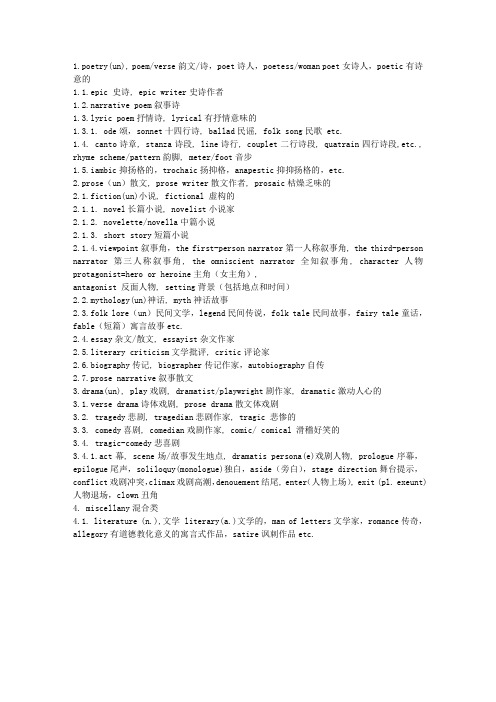
1.poetry(un), poem/verse韵文/诗,poet诗人,poetess/woman poet女诗人,poetic有诗意的1.1.epic 史诗, epic writer史诗作者1.2.narrative poem叙事诗1.3.lyric poem抒情诗, lyrical有抒情意味的1.3.1. ode颂,sonnet十四行诗, ballad民谣, folk song民歌 etc.1.4. canto诗章, stanza诗段, line诗行, couplet二行诗段, quatrain四行诗段,etc., rhyme scheme/pattern韵脚, meter/foot音步1.5.iambic抑扬格的,trochaic扬抑格,anapestic抑抑扬格的,etc.2.prose(un)散文, prose writer散文作者, prosaic枯燥乏味的2.1.fiction(un)小说, fictional 虚构的2.1.1. novel长篇小说, novelist小说家2.1.2. novelette/novella中篇小说2.1.3. short story短篇小说2.1.4.viewpoint叙事角,the first-person narrator第一人称叙事角, the third-person narrator第三人称叙事角, the omniscient narrator全知叙事角, character人物protagonist=hero or heroine主角(女主角),antagonist 反面人物, setting背景(包括地点和时间)2.2.mythology(un)神话, myth神话故事2.3.folk lore(un)民间文学,legend民间传说,folk tale民间故事,fairy tale童话,fable(短篇)寓言故事etc.2.4.essay杂文/散文, essayist杂文作家2.5.literary criticism文学批评, critic评论家2.6.biography传记, biographer传记作家,autobiography自传2.7.prose narrative叙事散文3.drama(un), play戏剧, dramatist/playwright剧作家, dramatic激动人心的3.1.verse drama诗体戏剧, prose drama散文体戏剧3.2. tragedy悲剧, tragedian悲剧作家, tragic 悲惨的3.3. comedy喜剧, comedian戏剧作家, comic/ comical 滑稽好笑的3.4. tragic-comedy悲喜剧3.4.1.act幕, scene场/故事发生地点, dramatis persona(e)戏剧人物, prologue序幕,epilogue尾声,soliloquy(monologue)独白,aside(旁白),stage direction舞台提示,conflict戏剧冲突,climax戏剧高潮,denouement结尾, enter(人物上场), exit (pl. exeunt)人物退场,clown丑角4. miscellany混合类4.1. literature (n.),文学 literary(a.)文学的,man of letters文学家,romance传奇,allegory有道德教化意义的寓言式作品,satire讽刺作品etc.。
中国文学术语集
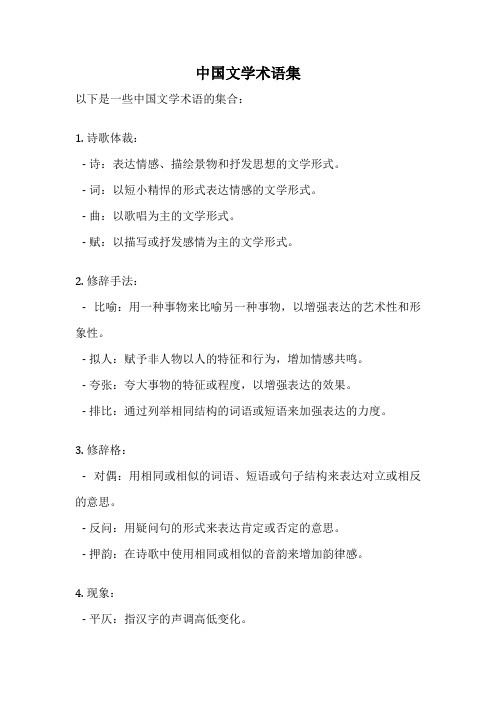
中国文学术语集
以下是一些中国文学术语的集合:
1. 诗歌体裁:
- 诗:表达情感、描绘景物和抒发思想的文学形式。
- 词:以短小精悍的形式表达情感的文学形式。
- 曲:以歌唱为主的文学形式。
- 赋:以描写或抒发感情为主的文学形式。
2. 修辞手法:
- 比喻:用一种事物来比喻另一种事物,以增强表达的艺术性和形象性。
- 拟人:赋予非人物以人的特征和行为,增加情感共鸣。
- 夸张:夸大事物的特征或程度,以增强表达的效果。
- 排比:通过列举相同结构的词语或短语来加强表达的力度。
3. 修辞格:
- 对偶:用相同或相似的词语、短语或句子结构来表达对立或相反的意思。
- 反问:用疑问句的形式来表达肯定或否定的意思。
- 押韵:在诗歌中使用相同或相似的音韵来增加韵律感。
4. 现象:
- 平仄:指汉字的声调高低变化。
- 押韵:在诗歌中使用相同或相似的音韵来增加韵律感。
- 韵律:诗歌中的节奏和音乐感。
5. 文学流派:
- 唐诗:盛行于唐朝的诗歌形式,以七言绝句为主要形式。
- 宋词:盛行于宋朝的短小精悍的诗歌形式。
- 元曲:盛行于元朝的戏剧形式,以曲子和对白相结合的形式。
这只是一些中国文学术语的集合,还有许多其他的术语和概念,用于描述和分析中国文学作品和文学创作的特点和风格。
文学术语

1. Allegory is a tale in verse or prose in which characters, actions, or settings represent abstract ideas or moral qualities.寓言是写成诗歌或散文形式的小故事其中人物、事件和场景代表抽象的观点或道德品质。
2. Alliteration is the repetition of the same initial consonant sound within a Line or a group of words.头韵是指在一行或一组词中第一个重读辅音的重复。
3. Allusion is reference to a person, a place, an event, or a literary work that a writer expects the reader to recognize and respond to.典故是作者对某些读者熟悉并能够作出反应的特定人物、地点、事件、文学作品的引用。
4. Analogy is a comparison made between two things to show the similarities between them.类比是为了在两个事物之间找出相似之处而进行的比较5. Antagonist is the principal character in opposition to the protagonist or hero or heroine of a narrative or drama.反面主角是叙事文学或戏剧中与男女主人公或正面人物相对立的主要人物6. Antithesis: the balancing of two contrasting ideas, words, or sentences.对仗指两组相对的思想、言辞、词句的平衡。
文学术语
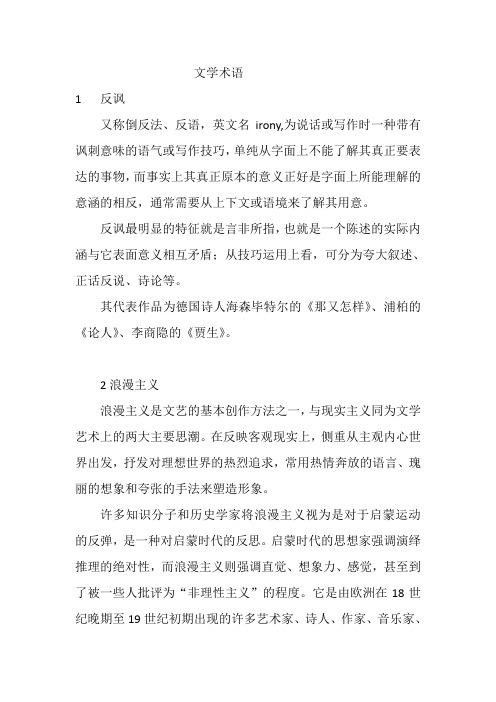
文学术语1 反讽又称倒反法、反语,英文名irony,为说话或写作时一种带有讽刺意味的语气或写作技巧,单纯从字面上不能了解其真正要表达的事物,而事实上其真正原本的意义正好是字面上所能理解的意涵的相反,通常需要从上下文或语境来了解其用意。
反讽最明显的特征就是言非所指,也就是一个陈述的实际内涵与它表面意义相互矛盾;从技巧运用上看,可分为夸大叙述、正话反说、诗论等。
其代表作品为德国诗人海森毕特尔的《那又怎样》、浦柏的《论人》、李商隐的《贾生》。
2浪漫主义浪漫主义是文艺的基本创作方法之一,与现实主义同为文学艺术上的两大主要思潮。
在反映客观现实上,侧重从主观内心世界出发,抒发对理想世界的热烈追求,常用热情奔放的语言、瑰丽的想象和夸张的手法来塑造形象。
许多知识分子和历史学家将浪漫主义视为是对于启蒙运动的反弹,是一种对启蒙时代的反思。
启蒙时代的思想家强调演绎推理的绝对性,而浪漫主义则强调直觉、想象力、感觉,甚至到了被一些人批评为“非理性主义”的程度。
它是由欧洲在18世纪晚期至19世纪初期出现的许多艺术家、诗人、作家、音乐家、以及政治家、哲学家等各种人物组成,其详细特征和定义一直到20世纪都仍是思想史和文学史界争议的题材。
其特征主要有:1 偏重于表现主观理想,抒发强烈的个人感情;2 描写自然风光,歌颂大自然;3 酷爱描写中世纪和以往的历史;4 重视民间文学,尤其是中世纪民间文学。
其代表是布莱克、华兹华斯《抒情歌妖姬》、科勒律治、拜伦、雪莱《西风颂》、普希金、贝多芬《第五交响曲》、肖邦、雨果《悲惨世界》、欧文《睡谷传说》、麦尔维尔《白鲸》、司格特《艾凡赫》、屈原《离骚》、李白《将进酒》、郭沫若3 清教主义清教主义起源于英国,在北美得以实践和发展。
其因信称义、天职思想、山巅之城等核心理念虽然构成宗教行为规范要素,却在很大程度上起到了消解禁锢人们思想和行为的主流教会传统的作用,促进了社会世俗化进程。
在早期的美国,推动力个性解放,促成建立现代劳动、职业和财富观,以宗教的理想勾勒出国家未来追求的目标。
文学评论常用的术语

文学评论常用的术语
1. “主题”,就像一部作品的灵魂啊!比如,它那奇幻又深刻的主题,不正是让我们沉浸其中的原因吗?
2. “人物形象”,这可是作品的血肉呀!像孙悟空,那鲜明独特的形象,谁能不记得呢?
3. “情节”,这不就是故事的脊梁嘛!里那跌宕起伏的情节,多吸引人啊!
4. “语言风格”,这简直是作品的外衣呀!张爱玲那细腻华丽的语言风格,多有魅力啊!
5. “意象”,如同作品中的闪光点!古诗中那些美妙的意象,不就是让我们陶醉的所在吗?
6. “象征”,那可是蕴含深意的密码呀!中的红高粱不就象征着生命力吗?
7. “叙事视角”,这是观察故事的眼睛呢!用独特的视角,让我们看到了不一样的世界。
8. “结构”,就像是建筑的框架呀!一部好作品的结构肯定是精巧的,不是吗?
9. “氛围”,是作品的独特气场呀!恐怖小说营造的那种紧张氛围,真让人毛骨悚然!
10. “寓意”,这可是作品的深层内涵呢!里的寓意,多给人启发啊!
我觉得这些文学评论常用术语就像一把把钥匙,能帮我们更好地打开文学作品的大门,深入领略其中的美妙。
文学名词解释

文学名词解释文学名词是用来描述文学作品、文学现象或文学理论的专门术语。
以下是一些常见的文学名词的解释:1. 小说:一种长篇故事性的文学作品,通常包含人物、情节和背景设置。
2. 诗歌:一种利用韵脚、节奏和意象等修辞手法表达思想和情感的文学形式。
3. 戏剧:一种通过角色的对话和行动来表达情节、观点和主题的文学作品,也可以指演出的艺术形式。
4. 散文:一种不使用诗歌形式的散文作品,以叙事、描写和议论为特点。
5. 史诗:一种叙述英雄传奇或重大历史事件的叙事诗歌形式。
6. 寓言:一种通过虚构的故事来传递道德或寓意的文学形式,常常包含人物化的动物或物体。
7. 韵文:一种使用韵脚的诗歌形式。
8. 抒情诗:一种表达作者个人情感和体验的诗歌形式。
9. 叙事诗:一种通过叙述来讲述故事或事件的诗歌形式。
10. 渲染:一种通过描写细节和氛围来表达情感或场景的文学技巧。
11. 刻画:一种通过描写人物的外貌、个性、思想和情感来使其栩栩如生的文学技巧。
12. 比喻:一种通过将一个事物与另一个事物进行类比来传递意义的修辞手法。
13. 暗示:一种通过暗示或间接暗示来传递意义或创造悬念的修辞手法。
14. 反讽:一种通过用词或语气的反差来传递愤怒、嘲笑或讽刺的修辞手法。
15. 典型:一种具有普遍性和代表性的文学人物、情节或主题。
16. 悬念:一种通过悬而未决的情节发展来引发读者的紧张感和好奇心的文学技巧。
17. 主题:一种作品中表达的基本思想、观点或价值观。
18. 道德:一种在作品中传递的道德准则或价值观。
19. 简洁:一种通过言简意赅地表达思想和情感的文学风格。
20. 风格:作家独特的写作方式,包括词语选择、句法结构和修辞手法等。
这些文学名词的解释可以帮助读者更好地理解和欣赏文学作品,同时也可以用于文学研究和批评中。
文学英语词汇大全了解经典文学作品的专业术语
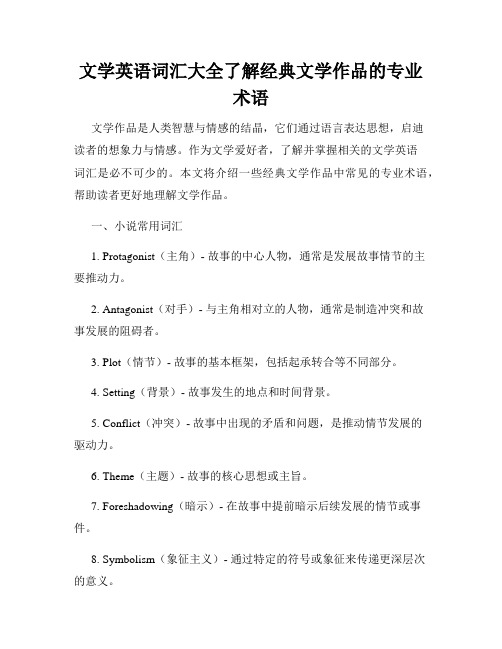
文学英语词汇大全了解经典文学作品的专业术语文学作品是人类智慧与情感的结晶,它们通过语言表达思想,启迪读者的想象力与情感。
作为文学爱好者,了解并掌握相关的文学英语词汇是必不可少的。
本文将介绍一些经典文学作品中常见的专业术语,帮助读者更好地理解文学作品。
一、小说常用词汇1. Protagonist(主角)- 故事的中心人物,通常是发展故事情节的主要推动力。
2. Antagonist(对手)- 与主角相对立的人物,通常是制造冲突和故事发展的阻碍者。
3. Plot(情节)- 故事的基本框架,包括起承转合等不同部分。
4. Setting(背景)- 故事发生的地点和时间背景。
5. Conflict(冲突)- 故事中出现的矛盾和问题,是推动情节发展的驱动力。
6. Theme(主题)- 故事的核心思想或主旨。
7. Foreshadowing(暗示)- 在故事中提前暗示后续发展的情节或事件。
8. Symbolism(象征主义)- 通过特定的符号或象征来传递更深层次的意义。
9. Irony(讽刺)- 用逆转的手法展示出与表面相反的结果或意义。
10. Point of view(视角)- 故事叙述的角度,可以是第一人称、第三人称等。
二、诗歌专业术语1. Rhyme(押韵)- 诗歌中相邻句子或词语的音韵相同或相似。
2. Meter(韵律)- 诗歌中由重音和轻音组成的节奏。
3. Stanza(诗节)- 诗歌中的一组排列整齐的行。
4. Simile(明喻)- 通过使用"like"或"as"来进行比喻的修辞手法。
5. Metaphor(隐喻)- 直接将一个事物比作另一个事物的修辞手法。
6. Personification(拟人)- 赋予非人事物以人类特征的修辞手法。
7. Alliteration(头韵)- 诗句中多个字母或音节以相同的辅音开头。
8. Assonance(押韵)- 诗句中多个字母或音节以相同的元音结尾。
文学理论术语小辞典
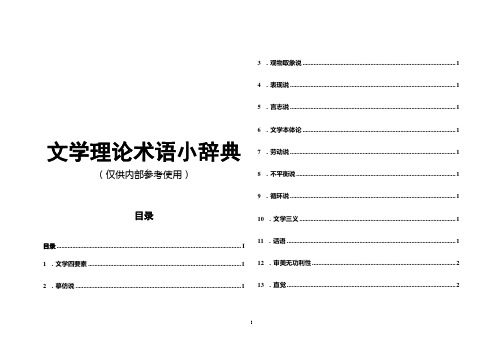
文学理论术语小辞典(仅供内部参考使用)目录目录 (I)1 .文学四要素 (1)2 .摹仿说 (1)3 .观物取象说 (1)4 .表现说 ......................................................................................................... 15 .言志说 (1)6 .文学本体论 (1)7 .劳动说 (1)8 .不平衡说 (1)9 .循环说 (1)10 .文学三义 (1)11 .话语 (1)12 .审美无功利性 (2)13 .直觉 (2)14 .文学的审美意识形态性质 (2)15 .文学的双重性质 (2)16 .话语蕴藉 (2)17 .含蓄与含混 (2)18 .文学 (2)19 .文学创造材料 (2)20 .艺术发现 (2)21 .创作动机 (2)22 .艺术构思 (2)23 .回忆与沉思 (2)24 .想象与联想 (3)25 .灵感与直觉 (3)26 .理智与情感 (3)27 .意识与无意识 (3)28 .综合 (3)29 .突出和简化 (3)30 .变形与陌生化 (3)31 .即兴与推敲 (3)32 .现实型文学 (4)33 .理想型文学 (4)34 .象征型文学 (4)35 .浪漫主义文学 (4)36 .现实主义文学 (4)37 .象征主义文学 (4)38 .现代主义文学 (4)39 .诗 (4)40 .小说 (4)41 .剧本 (4)42 .散文 ........................................................................................................... 543 .报告文学 (5)44 .文学本文三层次 (5)45 .文学话语的特征 (5)46 .文学形象及其特征 (5)47 .文学意蕴及其层次 (5)48 .文学典型 (5)49 .文学意境 (5)50 .情景交融 (5)51 .虚实相生 (5)52 .韵味无穷 (6)53 .审美意象 (6)54 .叙事 (6)55 .叙事的构成 (6)56 .本文时间和故事时间 (6)57 .时序 (6)58 .时长 (6)59 .频率 (6)60 .叙述视角 (6)61 .叙述动作 (6)62 .叙述者 (6)63 .拟想接受者 (6)64 .抒情及其特征 (7)65 .宣泄 (7)66 .抒情内容与抒情话语 (7)67 .声与情 (7)68 .景与情 (7)69 .抒情方式 (7)70 .抒情角色 (8)71 .风格 (8)72 .创作个性 (8)73 .话语情境 (8)74 .文学风格的特性 (8)75 .文学风格的形态 (8)76 .文学消费的二重性 (8)77 .期待视野 (8)78 .接受动机 (8)79 .接受心境 (8)80 .隐含的读者 ............................................................................................... 881 .填空、对话与兴味 .. (8)82 .还原与异变 (9)83 .理解与误解 (9)84 .期待遇挫 (9)85 .共鸣 (9)86 .净化 (9)87 .领悟 (9)88 .延留 (9)1 .文学四要素。
文学术语汇编简化版

文学术语汇编(考研用)11. Literature of the absurd: (荒诞派文学)2. Theater of the absurd: (荒诞派戏剧)3. Black comedy or black humor: (黑色幽默)文学术语汇编24. Aestheticism or the Aesthetic Movement(唯美主义):5. Allegory(寓言):6. Fable(寓言):7. Parable(寓言):(注意以上三个词在汉语中都翻译成语言,但是内涵并不相同,不要搞混)8. Alliteration(头韵): 9. Consonance 10. Assonance11. Allusion (典故)12. Ambiguity(复义性):文学术语汇编313. Antihero(反英雄):14. Antithesis(对照):15. Archaism(拟古):16. Atmosphere(氛围):文学术语汇编417. Ballad(民谣):18. Climax:19. Anticlimax(突降):20. Beat Generation(垮掉一代):文学术语汇编521. Biography(传记):22. Autobiography(自传):23. blank verse (无韵诗,素体诗(不押韵的五音步诗行))24. A parody(模仿)文学术语汇编625. Celtic Revival also known as the Irish Literary Renaissance (爱尔兰文艺复兴)26. Characters(人物)27. Chivalric Romance (or medieval romance) (骑士传奇或中世纪传奇)28. Comedy:(喜剧)29. Farce (闹剧)30. Confessional poetry(自白派诗歌)31. Critical Realism:(批判现实主义)32. Drama: (戏剧)文学术语汇编733. Dramatic Monologue:(戏剧独白)34. Elegy(哀歌或挽歌):35. Enlightenment(启蒙运动):36. Epic(史诗):37. Epiphany:(顿悟)38. Epithet: (绰号,诨名)39. Essay:(散文)40. Euphemism(委婉语): 41. Expressionism(表现主义):42. Free verse(自由体诗):文学术语汇编843. Gothic novel:44. Graveyard poets(墓园派诗人):45. Harlem Renaissance(哈莱姆文艺复兴):46. Heroic Couplet(英雄双韵体)47. Hyperbole(夸张):49. Imagism(意象派):50. Irony(反讽):51. Local Colorism(地方色彩)52. Lyric(抒情诗):。
文学术语

1、知我者,谓我心忧,不知我者,谓我何求。
(诗经王风黍离)2、人而无仪,不死何为。
(诗经风相鼠)3、言者无罪,闻者足戒。
(诗经大序)4、他山之石,可以攻玉。
(诗经小雅鹤鸣)5、投我以桃,报之以李。
(诗经大雅抑)6、天作孽,犹可违,自作孽,不可活。
(尚书)7、满招损,谦受益。
(尚书大禹谟)8、从善如登,从恶如崩。
(国语)9、多行不义必自毙。
(左传)10、居安思危,思则有备,有备无患。
(左传)11、人非圣贤,孰能无过?过而能改,善莫大焉。
(左传)12、知人者智,自知者明。
(老子)13、信言不美,美言不信。
(老子)14、祸兮福之所倚,福兮祸之所伏。
(老子)15、合抱之木,生于毫末;九层之台,起于累土;千里之行,始于足下。
(老子)16、敏而好学,不耻下问。
(论语公冶长)17、己所不欲,勿施于人。
(论语颜渊)18、工欲善其事,必先利其器。
(论语卫灵公)19、君子坦荡荡,小人长戚戚。
(论语述而)20、岁寒,然后知松柏之后凋也。
(论语子罕)21、学而不思则罔,思而不学则殆。
(论语为政)22、知者不惑,仁者不忧,勇者不惧。
(论语子罕)23、人谁无过?过而能改,善莫大焉。
(论语)24、知之为知之,不知为不知,是知也。
(论语为政)25、知之者不如好之者,好之者不如乐之者。
(论语雍也)26、其身正,不令而行;其身不正,虽令不从。
(论语子路)27、三人行,必有我师焉:择其善而从之,其不善者而改之。
(论语述而)28、大道之行,天下为公。
(礼记礼运)29、凡事预则立,不预则废。
(礼记中庸)30、学然后知不足,教然后知困。
(礼记学记)31、玉不琢,不成器;人不学,不知道。
(礼记学记)32、路漫漫其修远兮,吾将上下而求索。
(屈原离骚)33、尺有所短,寸有所长。
(楚辞卜居)34、尽信书,不如无书。
(孟子尽心下)35、生于忧患,死于安乐。
(孟子告子下)36、得道多助,失道寡助。
(孟子公孙丑)37、民为贵,社稷次之,君为轻。
(孟子尽心上)38、穷则独善其身,达则兼济天下。
文学术语汇编

文学术语汇编11.Literature of the absurd: (荒诞派文学) The term is applied to a number of works in drama and prose fiction which have in common the sense that the human condition is essentially absurd, and that this condition can be adequately represented only in works of literature that are themselves absurd. The current movement emerged in France after the Second World War, as a rebellion against essential beliefs and values of traditional culture and traditional literature. They hold the belief that a human being is an isolated existent who is cast into an alien universe and the human life in its fruitless search for purpose and meaning is both anguish and absurd.2.Theater of the absurd: (荒诞派戏剧) belongs to literature of the absurd. Two representatives of this school are Eugene Ionesco, French author of The Bald Soprano (1949) (<秃头歌女>), and Samuel Beckett, Irish author of Waiting for Godot (1954) (<等待戈多>). They project the irrationalism, helplessness and absurdity of life in dramatic forms that reject realistic settings, logical reasoning, or a coherently evolving plot.3.Black comedy or black humor: (黑色幽默) it mostly employed to describe baleful, naïve, or inept characters in a fantastic or nightmarish modern world playing out their roles in what Ionesco called a “tragic farce”, in which the events are often simultaneously comic, horrifying, and absurd. Joseph Heller’s Catch-22 (美国著名作家约瑟夫海勒<二十二条军规>) can be taken as an example of the employment of this technique.文学术语汇编24. art for art’s sake: or the Aesthetic Movement(唯美主义): it began to prevail in Europe at the middle of the 19th century. The theory of “art for art’s sake” was first put forward by some French artists. They declared that art should serve no religious, moral or social purpose. The two most important representatives of aestheticists in English literature are Walt Pater and Oscar Wilde.5. Allegory(寓言): a tale in verse or prose in which characters, actions, or settings represent abstract ideas or moral qualities, such as John Bunyan’s The Pilgrim’s Prog ress. An allegory is a story with two meanings, a literal meaning and a symbolic meaning.6. Fable(寓言): is a short narrative, in prose or verse, that exemplifies an abstract moral thesis or principle of human behavior. Most common is the beast fable, in which animals talk and act like the human types they represent. The fables in Western cultures derive mainly from the stories attributed to Aesop, a Greek slave of the sixth century B. C.7. Parable(寓言): is a very short narrative about human beings presented so as to stress analogy with a general lesson that the narrator is trying to bring home to his audience. For example, the Bible contains lots of parables employed by Jesus Christ to make his flock understand his preach.8. Alliteration(头韵): the repetition of the initial consonant sounds. In Old English alliterative meter, alliteration is the principal organizing device of the verse line, such as in Beowulf.9. Consonance is the repetition of a sequence of two or more consonants but with a change in the intervening vowel, such as “live and love”.10. Assonance is the repetition of identical or similar vowel, especially in stressed syllables, in a sequence of nearby words, such as “child of silence”.11. Allusion (典故)is a reference without explicit identification, to a literary or historical person, place, or event, or to another literary work or passage. Most literary allusions are intended to be recognized by the generally educated readers of the author’s time, b ut some are aimed at a specialgroup.12. Ambiguity(复义性): Since William Empson(燕卜荪)published Seven Types of Ambiguity (《复义七型》), the term has been widely used in criticism to identify a deliberate poetic device: the use of a single word or expression to signify two or more distinct references, or to express two or more diverse attitudes or feeling.文学术语汇编313. Antihero(反英雄):the chief character in a modern novel or play whose character is totally different from the traditional heroes. Instead of manifesting largeness, dignity, power, or heroism, the antihero is petty, passive, ineffectual or dishonest. For example, the heroine of Defoe’s Moll Flanders is a thief and a prostitute.14. Antithesis(对照):(a figure of speech)An antithesis is often expressed in a balanced sentence, that is, a sentence in which identical or similar syntactic structure is used to express contrasting ideas. For example, “Marriage has many pains, but celibacy(独身生活)has no pleasures.” by Samuel Johnson obviously employs antithesis.15. Archaism(拟古):the literary use of words and expressions that have become obsolete in the common speech of an era. For example, the translators of the King James Version of Bible gave weight and dignity to their prose by employing archaism.16. Atmosphere(氛围): the prevailing mood or feeling of a literary work. Atmosphere is often developed, at least in part, through descriptions of setting. Such descriptions help to create an emotional climate to establish the reader’s expectations and attitudes.文学术语汇编417. Ballad(民谣):it is a song, transmitted orally, which tells a story. It originated and was communicated orally among illiterate or only partly literate people. It exists in many variant forms. The most common stanza form, called ballad stanza is a quatrain in alternate four- and three-stress lines; usually only the second and fourth lines rhyme. Although many traditional ballads probably originated in the late Middle Age, they were not collected and printed until the eighteenth century.18. Climax:as a rhetorical device it means an ascending sequence of importance. As a literary term, it can also refer to the point of greatest intensity, interest, or suspense in a story’s turning point. The action leading to the climax and the simultaneous increase of tension in the plot are known as the rising action. All action after the climax is referred to as the falling action, or resolution. The term crisis is sometimes used interchangeably with climax.19. Anticlimax(突降):it denotes a writer’s deliberate drop from the serious and elevated to the trivial and lowly, in order to achieve a comic or satiric effect. It is a rhetorical device in English. 20. Beat Generation(垮掉一代):it refers to a loose-knit group of poets and novelists, writing in the second half of the 1950s and early 1960s, who shared a set of social attitudes – antiestablishment, antipolitical, anti-intellectual, opposed to the prevailing cultural, literary, and moral values, and in favor of unfettered self-realization and self-expression. Representatives of the group include Allen Ginsberg, Jack Kerouac and William Burroughs. And most famous literary creations produced by this group should be Allen Ginsberg’s long poem Howl and Jack Kerouac’s On the Road.文学术语汇编521. Biography(传记):a detailed account of a person’s life written by another person, such a s Samuel Johnson’s Lives of the English Poets and James Boswell’s Life of Samuel Johnson.22. Autobiography(自传):a person’s account of his or her own life, such as Benjamin Franklin’s autobiography.23. Blank verse(无韵体): Verse written in unrhymed iambic pentameter. It is the verse form used in some of the greatest English poetry, including that of William Shakespeare and John Milton. 24. A parody(模仿)imitates the serious manner and characteristic features of a particular literary work, or the distinctive style of a particular author, or the typical stylistic and other features of a serious literary genre, and deflates the original by applying the imitation to a lowly or comically inappropriate subject.文学术语汇编625. Celtic Revival also known as the Irish Literary Renaissance (爱尔兰文艺复兴)identifies the remarkably creative period in Irish literature from about 1880 to the death of William Butler Yeats in 1939. The aim of Yeats and other early leaders of the movement was to create a distinctively national literature by going back to Irish history, legend, and folklore, as well as to native literary models. The major writers of this movement include William Butler Yeats, Lady Gregory, John Millington Synge and Sean O’Casey and so on.26. Characters(人物)are the persons represented in a dramatic or narrative work, who are interpreted by the reader as being endowed with particular moral, intellectual, and emotional qualities by inferences from the dialogues, actions and motivations. E. M. Forster divides characters into two types: flat character, which is presented without much individualizing detail; and round character, which is complex in temperament and motivation and is represented with subtle particularity.27. Chivalric Romance (or medieval romance) (骑士传奇或中世纪传奇)is a type of narrative that developed in twelfth-century France, spread to the literatures of other countries. Its standard plot is that of a quest undertaken by a single knight in order to gain a lady’s favor; frequently its central interest is courtly love, together with tournaments fought and dragons and monsters slain. It stresses the chivalric ideals of courage, loyalty, honor, mercifulness to an opponent, and elaborate manners.28. Comedy:(喜剧)in general, a literary work that ends happily with a healthy, amicable armistice between the protagonist and society.29. Farce (闹剧)is a type of comedy designed to provoke the audience to simple and hearty laughter. To do so it commonly employs highly exaggerated types of characters and puts them into improbable and ludicrous situations.30. Confessional poetry(自白派诗歌)designates a type of narrative and lyric verse, given impetus by Robert Lowell’s Life Studies, which deals with the facts and intimate mental and physical experiences of the poet’s own li fe. Confessional poetry was written in rebellion against the demand for impersonality by T. S. Elliot and the New Criticism. The representative writers of confessional school include Robert Lowell, Anne Sexton and Sylvia Plath and so on.31. Critical Realism:(批判现实主义)The critical realism of the 19th century flourished in the fouties and in the beginning of fifties. The realists first and foremost set themselves the task of criticizing capitalist society from a democratic viewpoint and delineated the crying contradictions of bourgeois reality. But they did not find a way to eradicate social evils. Representative writers of this trend include Charles Dickens and William Makepeace Thackeray and so on.32. Drama:(戏剧)The form of composition designed for performance in the theater, in whichactors take the roles of the characters, perform the indicated action, and utter the written dialogue. (The common alternative name for a dramatic composition is a play.)文学术语汇编733. Dramatic Monologue:(戏剧独白)a monologue is a lengthy speech by a single person. Dramatic monologue does not designate a component in a play, but a type of lyric poem that was perfected by Robert Browning. By using dramatic monologue, a single person, who is patently not the poet, utters the speech that makes up the whole of the poem, in a specific situation at a critical moment. For example, Robert Browning’s famous poem “My Last Duchess” was written in dramatic monologue.34. Elegy(哀歌或挽歌):a poem of mourning, usually over the death of an individual. An elegy isa type of lyric poem, usually formal in language and structure, and solemn or even melancholy in tone.35. Enlightenment(启蒙运动):The name applied to an intellectual movement which developed in Western Europe during the seventeenth century and reached its height in the eighteenth. The common element was a trust in human reason as adequate to solve the crucial problems and to establish the essential norms in life, together with the belief that the application of reason was rapidly dissipating the remaining feudal traditions. It influenced lots of famous English writers especially those neoclassic writers, such as Alexander Pope.36. Epic(史诗):it is a long verse narrative on a serious subject, told in a formal and elevated style, and centered on a heroic or quasi-divine figure on whose actions depends the fate of a tribe, a nation, or the human race.37. Epiphany:(顿悟)In the early draft of A Portrait of the Artist as a Young Man, James Joyce employed this term to signify a sudden sense of radiance and revelation that one may feel while perceiving a commonplace object. “Epiphany” now has become the standard term for the description, frequent in modern poetry and prose fiction, of the sudden flare into revelation of an ordinary object or scene.38. Epithet(移就): as a term in criticism, epithet denotes an adjective or adjectival phrase used to define a distinctive quality of a person or thing. This method was widely employed in ancient epics. For example, in Homer’s epic, the epithet like “the wine-dark sea” can be found everywhere.39. Essay:(散文)any short composition in prose that undertakes to discuss a matter, express a point of view, persuade us to accept a thesis on any subject, or simply entertain. The essay can be divided as the formal essay and the informal essay (familiar essay).40. Euphemism(委婉语): An inoffensive expression used in place of a blunt one that is felt to be disagreeable or embarrassing, such as “pass away” instead of “die”41. Expressionism(表现主义):a German movement in literature and the other arts which was at its height between 1910 and 1925 – that is, in the period just before, during, and after WWⅠ. The expressionist artist or writer undertakes to express a personal vision – usually a troubled or tensely emotional vision – of human life and human society. This is done by exaggerating and distorting. We recognize its effects, direct or indirect, on the writing and staging of such plays as Arthur Miller’s Death of a Salesman as well as on the theater of the absurd.42. Free verse(自由体诗):Like traditional verse, it is printed in short lines instead of with the continuity of prose, but it differs from such verse by the fact that its rhythmic pattern is notorganized into a regular metrical form – that is, into feet, or recurrent units of weak and strong stressed syllables. Most free verse also has irregular line lengths, and either lacks rhyme or else uses it only occasionally. Walt Whitman is a representative who employed this poem form successfully.文学术语汇编843. Gothic novel:(哥特式小说)It is a type of prose fiction. The writers of this type of fictions mostly set their stories in the medieval period and in a Catholic country, especially Italy or Spain. The locale was often a gloomy castle. The typical story focused on the sufferings imposed on an innocent heroine by a cruel villain. This type of fictions made bountiful use of ghosts, mysterious disappearances, and other supernatural occurrences. The principle aim of such novels was to evoke chilling terror and the best of this type opened up to the fiction the realm of the irrational and of the perverse impulses and nightmarish terrors that lie beneath the orderly surface of the civilized mind. Some famous novelists liked to employ some Gothic elements in their novels, such as Emily Bronte’s Wuthering Heights.44. Graveyard poets(墓园派诗歌): A term applied to eighteenth-century poets who wrote meditative poems, usually set in a graveyard, on the theme of human mortality, in moods which range from pensiveness to profound gloom. The vogue resulted in one of the most widely known English poems, Thomas Gray’s “Elegy Written in a Country Churchyard”.45. Harlem Renaissance(哈莱姆文艺复兴):a period of remarkable creativity in literature, music, dance, painting, and sculpture by African-Americans, from the end of the First World War in 1917 through the 1920s. As a result of the mass migrations to the urban North in order to escape the legal segregation of the American South, and also in order to take advantage of the jobs opened to African Americans at the beginning of the War, the population of the region of Manhattan known as Harlem became almost exclusively Black, and the vital center of African American culture in America. Distinguished writers who were part of the movement included Langston Hughes and Jean Toomer. The Great Depression of 1929 and the early 1930s brought the period of buoyant Harlem culture –which had been fostered by prosperity in the publishing industry and the art world – effectively to an end.46. Heroic Couplet(英雄双韵体)refers to lines of iambic pentameter which rhyme in pairs: aa, bb, cc, and so on. The adjective “heroic” was applied in the later seventeenth century because of the frequent use of such couplets in heroic poems and dramas. This verse form was introduced into English poetry by Geoffrey Chaucer. From the age of John Dryden through that of Samuel Johnson, the heroic couplet was the predominant English measure for all the poetic kinds; some poets, including Alexander Pope, used it almost to the exclusion of other meters.47. Hyperbole(夸张):this figure of speech called hyperbole is bold overstatement, or the extravagant exaggeration of fact or of possibility. It may be used either for serious or ironic or comic effect.48. Understatement(轻描淡写):this figure of speech deliberately represents something as very much less in magnitude or importance than it really is, or is ordinarily considered to be. The effect is usually ironic.49. Imagism(意象派):it was a poetic vogue that flourished in England, and even more vigorously in America, between the years 1912 and 1917. It was planned and exemplified by a group of English and American writers in London, partly under the influence of the poetic theory of T. E.Hulme, as a revolt against the sentimental and mannerish poetry at the turn of the century. The typical Imagist poetry is written in free verse and undertakes to be as precisely and tersely as possible. Meanwhile, the Imagist poetry likes to express the writers’ momentary impression of a visual object or scene and often the impression is rendered by means of metaphor without indicating a relation. Most famous Imagist poem, “In a Station of the Metro”, was written by Ezra Pound. Imagism was too restrictive to endure long as a concerted movement, but it influenced almost all modern poets of Britain and America.50. Irony(反讽):This term derives from a character in a Greek comedy. In most of the modern critical uses of the term “irony”, there remains the root sense of dissembling or hiding what is actually the case; not, however, in order to deceive, but to achieve rhetorical or artistic effects. 51. Local Colorism(地方色彩)was a literary trend belonging to Realism. It refers to the detailed representation in prose fiction of the setting, dialect, customs, dress and ways of thinking and feeling which are distinctive of a particular region. After the Civil War a number of American writers exploited the literary possibilities of local color in various parts of America. The most famous representative of local colorism should be Mark Twain who took his hometown near the Mississippi as the typical setting of nearly all his novels.52.Lyric(抒情诗):in the most common use of the term, a lyric is any fairly short poems consisting of the utterance by a single speaker, who expresses a state of mind or a process of perception, thought and feeling.53 回答问题Romanticism: In the most abstract terms, Romanticism may be regarded as the triumph of the values of imaginative spontaneity, visionary originality, wonder, and emotional self-expression over the classical standards of balance, order, restraint, proportion, and objectivity. Its name derives from romance, the literary form in which desires and dreams prevail over everyday realities.54 Byronic hero, characteristic of or resembling *Byron or his poetry; that is, contemptuous of and rebelling against conventional morality, or defying fate, or possessing the characteristics of Byron's romantic heroes, or imitating his dress and appearance; as *Meredith describes it, 'posturing statuesque pathetic'; or in the words of *Macaulay, 'a man proud, moody, cynical, with defiance on his brow, and misery in his heart, a scorner of his kind, implacable in revenge, yet capable of deep and strong affection'.55 回答问题Realism stressed 'sincerity' as opposed to the 'liberty' proclaimed by the Romantics; it insisted on accurate documentation, sociological insight, an accumulation of the details of material fact, an avoidance of poetic diction, idealization, exaggeration, melodrama, etc.; and subjects were to be taken from everyday life, preferably from lower-class life. This emphasis clearly reflected the interests of an increasingly positivist and scientific age.。
- 1、下载文档前请自行甄别文档内容的完整性,平台不提供额外的编辑、内容补充、找答案等附加服务。
- 2、"仅部分预览"的文档,不可在线预览部分如存在完整性等问题,可反馈申请退款(可完整预览的文档不适用该条件!)。
- 3、如文档侵犯您的权益,请联系客服反馈,我们会尽快为您处理(人工客服工作时间:9:00-18:30)。
Blank verse consists of lines of iambic pentameter (five-stress iambic verse) which are unrhymed —hence the term "blank." Of all English metrical forms it is closest to the natural rhythms of English speech, and at the same time flexible and adaptive to diverse levels of discourse; as a result it has been more frequently and variously used than any other type of versification.Free verse :is sometimes referred to as "open form" verse, or by the French term vers libre. Like traditional verse, it is printed in short lines instead of with the continuity of prose, but it differs from such verse by the fact that its rhythmic pattern is not organized into a regular metrical form —that is, into feet, or recurrent units of weak- and strong-stressed syllables. Most free verse also has irregular line lengths, and either lacks rhyme or else uses it only sporadically. (Blank verse differs from unrhymed free verse in that it is metrically regular.)alliteration:is the repetition of a speech sound in a sequence of nearby words. The term is usually applied only to consonants, and only when the recurrent sound begins a word or a stressed syllable within a word.American Renaissance:American Renaissance also called New England Renaissance。
Period from the 1830s roughly until the end of the American Civil War in which American literature, in the wake of the Romantic movement, came of age as an expression of a national spirit. Comedy :In the most common literary application, a comedy is a fictional work in which the materials are selected and managed primarily in order to interest and amuse us: the characters and their discomfitures engage our pleasurable attention rather than our profound concern, we are made to feel confident that no great disaster will occur, and usually the action turns out happily for the chief characters. The term "comedy" is customarily applied only to plays for the stage or to motion pictures; it should be noted, however, that the comic form, so defined, also occurs in prose fiction and narrative poetry.Enlightenment :The name applied to an intellectual movement and cul- tural ambiance which developed in western Europe during the seventeenth century and reached its height in the eighteenth. The common element was a trust in human reason as adequate to solve the crucial problems and to estab- lish the essential norms in life, together with the belief that the application of reason was rapidly dissipating the darkness of superstition, prejudice, and bar- barity, was freeing humanity from its earlier reliance on mere authority and unexamined tradition, andhad opened the prospect of progress toward a life in this world of universal peace and happiness. (See the idea of progress.) For some thinkers the model for "reason" was the inductive procedure of science,Free verse :is sometimes referred to as "open form" verse, or by the French term vers libre. Like traditional verse, it is printed in short lines instead of with the continuity of prose, but it differs from such verse by the fact that its rhythmic pattern is not organized into a regular metrical form—that is, into feet, or recurrent units of weak- and strong-stressed syllables. Most free verse also has irregular line lengths, and either lacks rhyme or else uses it only sporadically. (Blank verse differs from unrhymed free verse in that it is metrically regular.)Genre:A term, French in origin, that denotes types or classes of literature. The genres into which literary works have been grouped at different times are very numerous, and the criteria on which the classifications have been based are highly variable. Since the writings of Plato and Aristotle, however, there has been an enduring division of the overall literary domain into three large classes, in accordance with who speaks in the work: lyric (uttered throughout in the first person), epic or narrative (in which the narrator speaks in the first person, then lets his charactersspeak for themselves); and drama (in which the characters do all the talking). A similar tripartite scheme was elaborated by German critics in the late eighteenth and early nineteenth centuries, was echoed by James Joyce in his Portrait of the Artist as a Young Man (1916), ter 5, and functions still in critical discourse and in the general distinction in college catalogues, between courses in poetry, prose fiction, and drama.Gothic novel:The word Gothic originally referred to the Goths, an early Germanic tribe, then came to signify "germanic," then "medieval." "Gothic architecture" now denotes the medieval type of architecture, characterized by the use of the high pointed arch and vault, flying buttresses, and intricate re-cesses, which spread through western Europe between the twelfth and six-teenth centuries.Heroic couplet:Lines of iambic pentameter which rhyme in pairs: aa, bb, cc, and so on. The adjective "heroic" was applied in the later sev- enteenth century because of the frequent use of such couplets in heroic (that is, epic) poems and in heroic dramas. This verse form was introduced into English poetry by Geoffrey Chaucer (in The Legend of Good Women and most o The Canterbury Tales), and has been in constant use ever since. From the age John Dryden through that of Samuel Johnson, the heroic couplet was the pre- dominant English measure for all the poetic kinds; some poets, including Alexander Pope, used it almost to the exclusion of other meters.Irony:In Greek comedy the character called the eiron was a dissembler, who characteristically spoke in understatement and deliberately pretended to be less intelligent than he was, yet triumphed over the alazon—the self-deceiving and stupid braggart (see in Northrop Frye, Anatomy of Criticism 1957). In most of the modern critical uses of the term "irony/' there remains the root sense of dissembling or hiding what is actually the case; not, however, in order to deceive, but to achieve special rhetorical or artistic effects.Motif and theme;A motif is a conspicuous element, such as a type of incident, device, reference, or formula, which occurs frequently in works of literature. The "loathly lady" who turns out to be a beautiful princess is a common motif in folklore, and the man fatally bewitched by a fairy lady is a motif adopted from folklore in Keats' "La Belle Dame sans Merci" (1820). Common in lyric poems is the ubi sunt motif, the "where-are" formula for lamenting the vanished past ("Where are the snows of yesteryear?"), and also the carpe diem motif, whose nature is sufficiently indicated by Robert Herrick's title "To the Virgins, to Make Much of Time." An aubade—from the OldFrench "alba," meaning dawn—is an early-morning song whose usual motif is an urgent request to a beloved to wake up. A familiar example is Shakespeare's "Hark, hark, the lark at heaven's gate sings."Plot:The plot (which Aristotle termed the mythos) in a dramatic or narrative work is constituted by its events and actions, as these are rendered and ordered toward achieving particular artistic and emotional effects.Point of view: signifies the way a story gets told—the mode (or modes) established by an author by means of which the reader is presented with the characters, dialogue, actions, setting, and events which constitute the nanative in a work of fiction. The question of point of view has always been a practical concern of the novelist, and there have been scattered observations on thematter in critical writings since the emergence of the modern novel in the eighteenth century. Pun:A play on words that are either identical in sound (homonyms) or very similar in sound, but are sharply diverse in meaning; an example is the last word in the title of Oscar Wilde's comedy, The Importance of Being Earnest (1895). Puns have often had serious literary uses.PuritanismRhyme:In English versification, standard rhyme consists of the repetition, in the rhyming words, of the last stressed vowel and of all the speech sounds following that vowelSetting: The overall setting of a narrative or dramatic work is the general locale, historical time, and social circumstances in which its action occurs; the setting of a single episode or scene within such a work is the particular physical location in which it takes place.Stanza:A stanza (Italian for "stopping place") is a grouping of the verse-lines in a poem, often set off by a space in the printed text. Usually the stanzas of a given poem are marked by a recurrent pattern of rhyme and are also uniform in the number and lengths of the component lines'Style:Style has traditionally been defined as the manner of linguistic expression in prose or verse —as how speakers or writers say whatever it is that they say. The style specific to a particular work or writer, or else distinctive of a type of writings, has been analyzed in such terms as the rhetorical situation and aim ; characteristic diction, or choice of words; type of sentence structure and syntax; and the density and kinds of figurative language.Transcendentalism in America: A philosophical and literary movement,centered in Concord and Boston, which was prominent in the intellectual and cultural life of New England from 1836 until just before the Civil War. It was inaugurated in 1836 by a Unitarian discussion group that came to be called the Transcendental Club. In the seven years or so that the group met at various houses, it included at one time or another Ralph Waldo Emerson, Bronson Alcott, Frederick Henry Hedge, W. E. Channing and W. H. Channing, Theodore Parker, Margaret Fuller, Elizabeth Peabody, George Ripley, Nathaniel Hawthorne, Henry Thoreau, and Jones Very. A quarterly periodical The Dial (1840-44) printed many of the early essays, poems, and reviews by the Transcendentalists.Enlightenment :The name applied to an intellectual movement and cultural ambiance whichdeveloped in western Europe during the seventeenth century and reached its height in the eighteenth. The common element was a trust in human reason as adequate to solve the crucial problems and to establish the essential norms in life, together with the belief that the application of reason was rapidly dissipating the darkness of superstition, prejudice, and barbarity, was freeing humanity from its earlier reliance on mere authority and unexamined tradition, and had opened the prospect of progress toward a life in this world of universal peace and happiness. In America, Benjamin Franklin and Thomas Jefferson represented the principles of the French and English Enlightenment, which also helped shape the founding documents of the United States, the Declaration of Independence and the Constitution.GenreA term, French in origin , that denotes types or classes of literature. It is a type of category of literature marked by certain shared features or customs. The three broadest categories of genre include poetry, drama, and fiction. These general genres are often subdivided intomore specific genres and subgenres. For example, the poetry can be sub-classified as epic, elegy, lyric, and pastoral and so on.Gothic novelGothic novel is a story of terror and suspense usually set in a gloomy old castle and monastery. In an extended sense, many novels that do not have a medievalized setting, but which share a comparably sinister, grotesque, or claustrophobic atmosphere have been classed as Gothic. It contributed to the new emotional climate of romanticism.American renaissanceAmerican renaissance is also called New England Renaissance. It is a flourishing of distinctively American literature in the period from the 1830s roughly until the end of the civil war. The renaissance is led by Emerson, Hawthorne, Thoreau and stirred by the teaching of transcendentalism. It is regarded as the delayed manifestation of Romanticism especially in Emerson’s philosophy of transcendentalism.。
